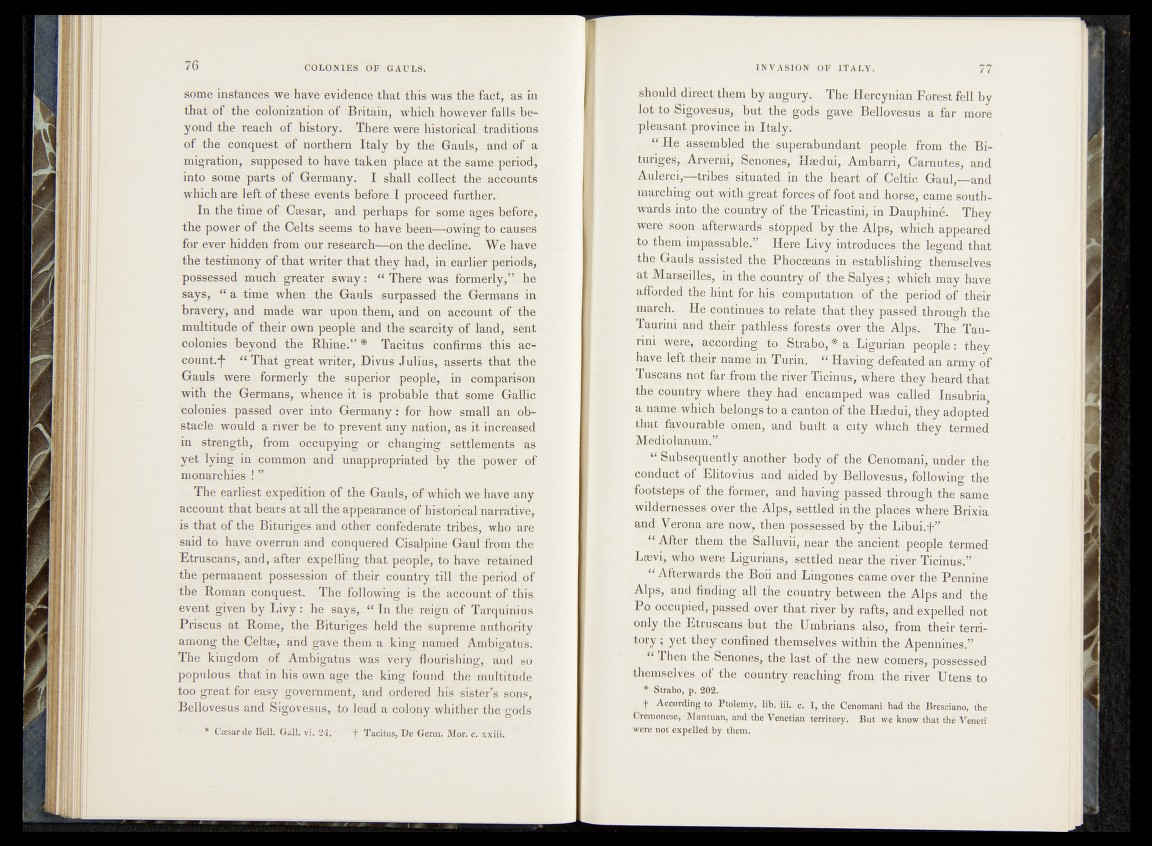
some instances we have evidence that this was the fact, as in
that of the colonization of -Britain, which however falls beyond
the reach of history. There were historical traditions
of the conquest of northern Italy by the Gauls, and of a
migration, supposed to have taken place at the same periodi
into some Tarts of Germany. - I shall collect the .accounts
which are left of thèse events before I proceed further.
In the time of- Caesar, and perhaps ; for some ages" before,
the power of the Celts’ seems .to have been—owing to causes
for ever hidden from our research—on the decline. We have
the testimony of that writer that they had, in earlier periods,
possessed much greater swayv: “ There was formerly,5’Pha
says, “ a time when the Gauls surpassed the Germans ik;
bravery, and made war upon them, and on account of the
multitude ö flh e ir own people and the scarcity of land^sênt
colonies beyond the Rhine.” # Tacitus 'confirms this ac-
count.f “ That great writer, Divus Julius^ asserts that th>e
Gauls were formerly the superior people, in comparison
with the Germans, whence it is probable that Sbmè Gallic
colonies passed over into Germany : for hôw smsSKan . obstacle
would a river be to prevent any nation, as it increased
in strength, from occupying or changing settlements'iîâs
yet l^pg.;in commons anti unappropriated ' by of
monarchies ! ” \
The earliest expedition of the Gauls, of which ife have any
account that bears at all theappearanee of histojgcal
is that of the BituSges and other confederate tribes, whollfe.
said to have overrun and conquered Cisalpine Gaul fVom the
Etruscans, and, after expelling that people, to have retained
the permanent possession of their countrÿ till the pèriod o f
the Roman conquest. The following is the account of th i|
event given by Livy : he says, “ In the reign of Tarquinius
Priscus at Rome, the Bituriges held the supreme authority
among the Celtæ, and gave them a king named Ambigatus.
The kingdom of Ambigatus was "Very flourishing, and so
populous that in his own age the king: found the multitude
too great .for easy .government, and ordered his sister’s” sons,
Bellovesus and Si’govesus, to lead a colony whither the gods
* Caesar de Bell. Gall. vi. 24. + TacitUs, De Germ. Mot. &xxiH.
should direct them by augury. The. Hercynian Forest fell by
l°»Lvtp sSigpYe.s.us, , ,but the gods gave Bellovesus a far more
pleasant .province in Itd.lv.
H^nssembjed^the ^superabundant people from the Bi-
Af^rni, Sengnesy, Hsedui, Ambarri, Carnutes, and
Auferci,—tribes^jiti^ated in the heart of Celtic Gaul,—and
marching out_^||h ,greut fqrcgsjof lent and horse, came southwards
into t^^J^try^fthe Tricastini; ini DauphinA They
^afterwards stj|;pe|^^y. the Alps, which appeared
tfo^herp^ impassab||| Here,Lpy introduces the legend that
assisted,jthe Ph^pseans in.establishing themselves
at .Mar^ejl^es, in, the country of the Salyes; which may have
.hint ;f©Whis. computation^ of the i period of their
march. He .G| ntinues to relate that theyrpassedVthrough the
j^rini arid, t^i^gath^^ss.To.rests over.th’e. Alps. The Tau-
rini were,, aGco|dingLt0^trnho,^ a Ligurian people: they
have left^^r n-4]|i^in Turin. “ Having||efeated>n army of
| ) B « g 8 | far,.fipm^hejiyer Ticinus, where {hey heard that
the country where they had encamped was call^tf Insubria
a narpe which,|^®^s to a.pant^n of the Haedui, they adopted
that f^ypura^.^om;^!^ and built a city which they termed
MedioJanumiS
, I another body p f the'Cenomani, under the
conduct of j Elitovius^ and aided by Bellovesus, following the
Ig^tsteps of the former, and haying, passed through the same
w,il,d^hess^s„ over the Alps^settled »Mthe places where Brixia
and Verona, pre nqw, then possessed hy>the Libui.f”
“ After them the Salluvii, near the ancient people termed
Laevi, whq were Liguimns,>;|fettled near the river Ticinus.*^'
“ Afterwards the Boii and Lingones came Over the Pennipe
Alps, and finding all the country, between the Alps and the
Po occupied, passed over that river-by rafts, and expelled not
only the Etruscans but.; the Umbrians glso, from their, terri-
they confined themselves within the Apennines.”
‘ Then,the Senones, the last of tiie' new comers, possessed
themselves ,of the' country peaching from the river Utens to
* Strabo, p. 202,
.. f , According tp ! Ptolemy, life. iii. e. 1, the Cctaomani had the Bresciano, the
Cremonese, Mantuan, and the Venetian territory. But we know that the Veneti
were not expelled, by them.